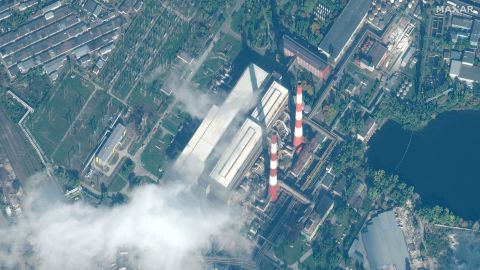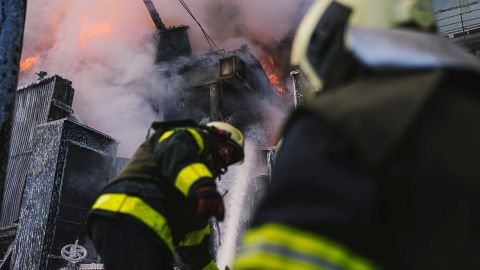Sana Noor Haq, Gul Tuysuz and Uliana Pavlova
Thirty percent of Ukraine’s power stations have been destroyed in just over a week, leading to “massive blackouts” across the country, President Volodymyr Zelensky said Tuesday, as the Kremlin steps up attacks on critical energy infrastructure.
“Another kind of Russian terrorist attacks: targeting energy & critical infrastructure. Since Oct. 10, 30% of Ukraine’s power stations have been destroyed, causing massive blackouts across the country,” Zelensky tweeted Tuesday.
He added that there was “no space left for negotiations with (Russian President Vladimir) Putin’s regime.”
The Russian Defense Ministry later confirmed that the country’s military had launched high-precision strikes on “energy systems” in Ukraine.
“During the day, the Armed Forces of the Russian Federation continued to strike with long-range high-precision air and sea-based weapons on military command and energy systems of Ukraine, as well as arsenals with foreign-made ammunition and weapons, all designated targets were hit,” Lieutenant-Colonel Igor Konashenkov said Tuesday.
The death toll in Kyiv continues to climb this week, officials said. At least five people were killed Monday following Russian attacks with Iranian-made “kamikaze” drones and at least three people died in separate strikes on Tuesday.

Russia has rapidly increased targeted attacks on Ukrainian energy facilities, leaving multiple cities with power deficits.Maxar Technologies/Reuters
‘Save water as much as possible’
Moscow has targeted key Ukrainian power facilities in recent days, leaving areas in at least three cities without power.
A residential neighborhood in the capital Kyiv is experiencing power cuts and water outages, local energy company DTEK said on Facebook Tuesday.
“Russian shelling has damaged a critical infrastructure facility in the Desnyansky district, causing interruptions in the electricity supply to the residents of the Troyeshchyna residential district and the water channel that supplies water to the Left Bank of the capital,” the company said.
In Dnipropetrovsk region, at least three areas, including parts of Dnipro city, experienced electrical outages and a water pumping facility lost power after Russia launched two missiles at an energy facility, causing “fire and severe destruction,” according to local authorities.
A CNN team in Dnipro saw from a distance the aftermath of a hit on a power plant in Dnipro and smoke rising from the facility.
Further west, the mayor of Zhytomyr said in a statement that the city was experiencing power and water cuts, with hospitals running on back up energy.

The mayor of Kyiv called on residents to save "electricity" and "water," as a Russian missile strike damaged a power plant in the city.State Emergency Service of Ukraine/Reuters
Residents in the Ukrainian capital were also urged by local officials to limit electricity and water usage, after two key infrastructure complexes were hit on Tuesday.
“Currently, the provision of electricity and water supply services is partially limited in many houses on the left bank of the capital … I appeal to all Kyiv residents to save electricity as much as possible,” the city’s mayor, Vitali Klitschko, said on Telegram.
“For residents who have low pressure in the water supply network – save water as much as possible now.”
The World Health Organization (WHO) has warned of a “humanitarian emergency” as Putin’s military assault on Ukraine approaches the “brutal” winter months.
“Too many people in Ukraine are living precariously, moving from location to location, living in substandard structures or without access to heating. This can lead to frostbite, hypothermia, pneumonia, stroke and heart attack,” Hans Henri P. Kluge, the WHO’s regional director for Europe, said Friday.
“The destruction of houses and lack of access to fuel or electricity due to damaged infrastructure could become a matter of life or death if people are unable to heat their homes.”
No comments:
Post a Comment